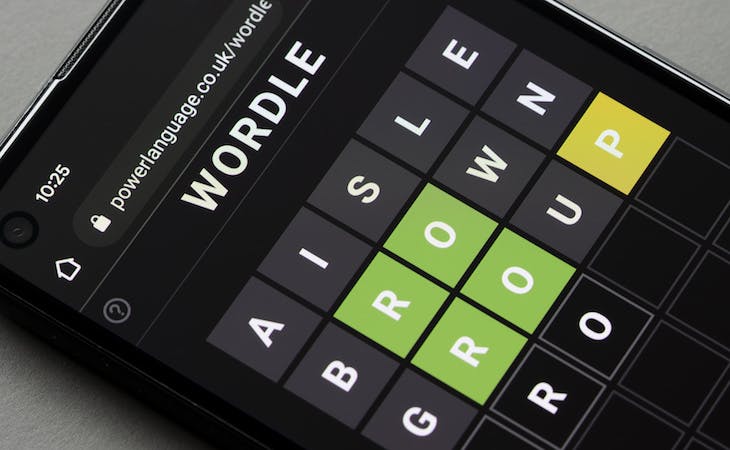Chances are, you’re hooked on Wordle—or you know someone who is. The web-based puzzle game has gone viral in recent weeks. In fact, The Guardian reports that as many as two million people now play Wordle every day.
It makes sense that Wordle would become so big. The pandemic has left many of us feeling anxious, burnt out, and desperately looking for something to take our minds off things. Enter this simple little puzzle game that only takes a few minutes to play and does a great job of distracting us from the current state of the world—for a little while, at least.
Wordle isn’t just a mindless game, though—it can actually help you get a good night’s sleep. Here’s everything you need to know about Wordle and how to add it to your daily routine for better shuteye.
What is Wordle?
Wordle is a web-based word game that refreshes every day. The goal of the game is to guess the five-letter word of the day in six tries or less.
If you have the right letter in the right spot, it shows up green. If you have the right letter in the wrong spot, it shows up yellow. And if you have a letter that isn’t in the word at all, it shows up gray.
Wordle was originally created in October 2021 by Brooklyn-based software engineer Josh Wardle. He made the game for his partner, who was obsessed with the New York Times crossword puzzle and the Spelling Bee game.
Wardle noticed people sharing their results in a stylized grid to show their progress, so he added that feature to the game itself so fans could share their daily results without spoiling the word of the day.
The rest is history—now you can’t scroll through Twitter without seeing someone (or many someones) on your feed sharing their daily Wordle results.
Is Wordle good for your sleep?
In general, puzzles—whether jigsaw or crossword—can be very relaxing and good for your sleep. Focusing on one thing for a long period, without outside thoughts entering your mind, is essentially meditation. And research shows mindfulness can have major benefits when it comes to relieving stress and helping you sleep.
“Wordle, much like a puzzle or crossword, offers a moment of restoration,” notes writer Anne Helen Peterson in a recent article titled The Rot of Candy Crush and the Rest of Wordle. “The mind is active but calm; I choose to start it, and then it ends.”
Wordle is also very low stakes, which adds to its relaxing vibe. As writer Aja Romano explains in a recent article for Vox, Wordle is “an easy, low-stress way of generating conversation and achieving a straightforward daily task in an era where even daily tasks and low-key interaction are sometimes strenuous and overwhelming.”
There’s also a low barrier to entry to play Wordle, making for a pretty stress-free experience. “You just have to open a website, you don’t need to make an account,” Katy Pearce, associate professor in communication at the University of Washington, tells Vox. “And the sharing of the result is quite simple.”
Plus, figuring out the word of the day can give you a sense of accomplishment and a hit of dopamine, aka the “happy hormone,” Drew Lightfoot, licensed therapist in Philadelphia who studies gaming culture, tells the Washington Post.
“There is research that shows if we intentionally play games for an hour a day, that is very healthy for our emotional wellbeing,” says Lightfoot.
What’s the best time of day to play Wordle?
Of course, there’s one big caveat to keep in mind when it comes to playing Wordle, particularly at night.
Wordle is a puzzle game you have to play on an electronic device—either your phone or a computer. These devices emit blue light, which reduces your brain’s production of melatonin, a hormone that plays a role in regulating sleep. When you use an electronic device too close to bedtime, it can make it harder to fall asleep.
So be smart about what time you play the game.
Most experts don’t recommend staring at your screen right before bed. If you’re going to play Wordle at night, then try to do it one or two hours before hitting the sheets. That way you’ll reap the stress-relieving benefits without the negative effects of blue light.
Playing Wordle in the morning is also an excellent option and can help you start your day off on a positive note.
“I’ve welcomed Wordle into my morning routine because it’s fast,” says writer Tanay Howard in a recent article for Parents. “Most mornings it takes me no time at all.”
Howard adds that Wordle has become something she looks forward to every morning. “When my one puzzle is done for the day, I can go about the day pretending that I have the rest of my life together,” she says.
Looking for other ways to de-stress beyond Wordle? We put together a list of relaxing activities that can help you get better sleep.




